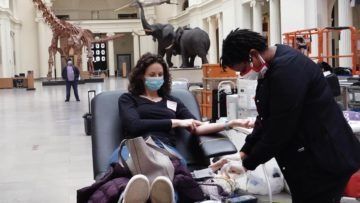Nathaniel Scharping in Undark:

In March, as the Covid-19 pandemic began to shut down major cities in the U.S., researchers were thinking about blood. In particular, they were worried about the U.S. blood supply — the millions of donations every year that help keep hospital patients alive when they need a transfusion.
The researchers were able to put to rest their initial concerns about the virus spreading via the blood supply. But they quickly realized that all those blood donations might offer a vital source of data on the pandemic.
When Covid-19 infects someone, the immune system’s response to the virus leaves behind detectable proteins in their blood. In March, with funding from the National Institutes of Health, a group of scientists working with blood banks around the country quickly launched a program to surveil the blood supply in certain regions for those traces of Covid-19 infection. With funding from the Centers for Disease Control and Prevention, that initial program expanded to a nationwide effort known as the Multistate Assessment of SARS-CoV-2 Seroprevalence (MASS) study, which has analyzed roughly 800,000 donations so far.
More here.
